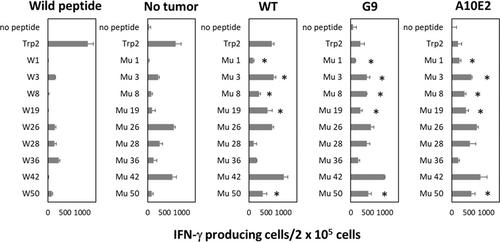当前位置:
X-MOL 学术
›
Cancer Sci.
›
论文详情
Our official English website, www.x-mol.net, welcomes your
feedback! (Note: you will need to create a separate account there.)
Suppression of high mobility group box 1 in B16F10 tumor does not inhibit the induction of neoantigen-specific T cells
Cancer Science ( IF 4.5 ) Pub Date : 2022-09-03 , DOI: 10.1111/cas.15563 Kayoko Waki 1 , Miyako Ozawa 1 , Akira Yamada 1
Cancer Science ( IF 4.5 ) Pub Date : 2022-09-03 , DOI: 10.1111/cas.15563 Kayoko Waki 1 , Miyako Ozawa 1 , Akira Yamada 1
Affiliation

|
Accumulated clinical data of immune checkpoint blockades have suggested the importance of neoantigens in cancer immunity. Tumor antigens are released from dead cancer cells together with cellular components, such as damage-associated molecular patterns (DAMPs), into the tumor microenvironment. We recently reported that high mobility group box 1 (HMGB1), a representative DAMP molecule, showed a negative impact on anti-tumor immunity. However, a positive role of HMGB1 in the initiation of innate and subsequent adaptive immunity has also been demonstrated; thus, the effects of HMGB1 on anti-tumor immunity have not been well understood. In this study, we identified nine immunogenic neoantigen epitopes of B16F10 murine melanoma cells and subsequently investigated the effects of suppression of HMGB1 on the induction of neoantigen-specific immunity using HMGB1-knockout tumors. Neoantigen-reactive T cells were expanded in B16F10 tumor-bearing mice, and T cell receptor repertoire analysis suggested that neoantigen-reactive T cells were oligo-clonally increased in B16F10 tumor bearers. An increase of neoantigen-reactive T cells and oligoclonal expansion of the T cells were similarly detected in HMGB1-knockout tumor-bearing mice. The induction of neoantigen-specific immunity under the suppression of HMGB1 in the tumor microenvironment shown in this study supports further development of combination therapy of HMGB1 suppression with neoantigen-targeted cancer immunotherapies, including immune checkpoint blockade therapy.
中文翻译:

抑制 B16F10 肿瘤中的高迁移率族盒 1 不会抑制新抗原特异性 T 细胞的诱导
免疫检查点阻断的累积临床数据表明新抗原在癌症免疫中的重要性。肿瘤抗原与细胞成分(例如损伤相关分子模式 (DAMP))一起从死亡的癌细胞中释放到肿瘤微环境中。我们最近报道了高迁移率族盒 1 (HMGB1),一种代表性的 DAMP 分子,显示出对抗肿瘤免疫的负面影响。然而,HMGB1 在先天性和随后的适应性免疫启动中的积极作用也已得到证实;因此,HMGB1 抗肿瘤免疫力的作用尚未得到充分了解。在这项研究中,我们鉴定了 B16F10 小鼠黑色素瘤细胞的九个免疫原性新抗原表位,随后研究了抑制 HMGB1 对使用 HMGB1 敲除肿瘤诱导新抗原特异性免疫的影响。新抗原反应性 T 细胞在 B16F10 肿瘤携带小鼠中扩增,T 细胞受体库分析表明新抗原反应性 T 细胞在 B16F10 肿瘤携带者中寡克隆增加。在 HMGB1 敲除荷瘤小鼠中同样检测到新抗原反应性 T 细胞的增加和 T 细胞的寡克隆扩增。本研究表明,在肿瘤微环境中抑制 HMGB1 可诱导新抗原特异性免疫,支持进一步开发 HMGB1 抑制与新抗原靶向癌症免疫疗法的联合疗法,
更新日期:2022-09-03
中文翻译:

抑制 B16F10 肿瘤中的高迁移率族盒 1 不会抑制新抗原特异性 T 细胞的诱导
免疫检查点阻断的累积临床数据表明新抗原在癌症免疫中的重要性。肿瘤抗原与细胞成分(例如损伤相关分子模式 (DAMP))一起从死亡的癌细胞中释放到肿瘤微环境中。我们最近报道了高迁移率族盒 1 (HMGB1),一种代表性的 DAMP 分子,显示出对抗肿瘤免疫的负面影响。然而,HMGB1 在先天性和随后的适应性免疫启动中的积极作用也已得到证实;因此,HMGB1 抗肿瘤免疫力的作用尚未得到充分了解。在这项研究中,我们鉴定了 B16F10 小鼠黑色素瘤细胞的九个免疫原性新抗原表位,随后研究了抑制 HMGB1 对使用 HMGB1 敲除肿瘤诱导新抗原特异性免疫的影响。新抗原反应性 T 细胞在 B16F10 肿瘤携带小鼠中扩增,T 细胞受体库分析表明新抗原反应性 T 细胞在 B16F10 肿瘤携带者中寡克隆增加。在 HMGB1 敲除荷瘤小鼠中同样检测到新抗原反应性 T 细胞的增加和 T 细胞的寡克隆扩增。本研究表明,在肿瘤微环境中抑制 HMGB1 可诱导新抗原特异性免疫,支持进一步开发 HMGB1 抑制与新抗原靶向癌症免疫疗法的联合疗法,











































 京公网安备 11010802027423号
京公网安备 11010802027423号